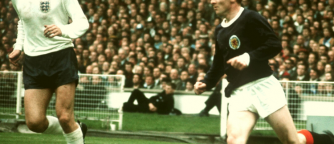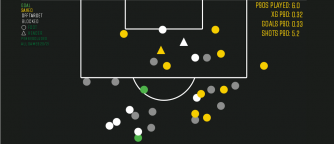One of the biggest opinion-splitters in Celtic’s recent history, the fact that Daizen Maeda’s place in the starting XI seems more secure than ever might say more about the club than it does about him.
It’s an unspoken truth of the Celtic supporting experience that we always need a good subplot on the go. Good pub argument material.
And it’s at times like these, when the transfer window has closed, the manager is relatively secure in his position, and Rangers – for now at least – don’t seem to pose much of a threat, that the volume of these pub arguments is really amplified, and you almost start to worry about Roadhouse-esque scenes of violent chaos breaking out in The Fiveways. Of course it’s all in good nature, and sadly, modern society dictates that these debates are now much likelier to take place on social media than a good old-fashioned boozer anyway. But it is kind of amusing to reflect that someone so placid and polite, someone who has almost certainly never set foot in a pub, much less one at Parkhead Cross, with a temperament even smoother than that completely hairless head of his, could be the cause of so much bitter disagreement.
I’m talking of course about Divisive Daizen Maeda, to give him his ring name: the man with the stamina of Haile Gebrselassie and occasionally the first touch of a Highland cow. Since arriving almost two years ago as a £1.5m signing from Yokohama F Marinos (which even his harshest critics would have to concede was daylight robbery), Maeda has made 79 appearances for Celtic, scoring 20 goals, providing 13 assists and winning four trophies. Precise figures for how many on-field marathons he’s completed during that time, or how many times James Tavernier has woken up in a cold sweat thinking about him, were not available.
Rarely ever dropped for big games, frequently love-bombed in the press by both of the managers he has served under and given a new deal as one of Brendan Rodgers’ first acts after returning to the club, by any reasonable yardstick the winger has been a success as a Celtic player. But the thing is, there are two Daizen Maedas (disappointing news for anyone hoping to secure silver in the Dads’ race at school sports day). There’s the Jekyll side, the one that Ange Postecoglou and now Rodgers have seen every time they look at him; presumably the same one that Japan boss Hajime Moriyasu sees too, having made Maeda the focal point of his attack in the Samurai Blue’s shock wins over Germany and Spain at last year’s World Cup. But then there’s Hyde. You know, the guy who cut in off the right wing against St Johnstone in August and nearly snapped the flagpoles on top of the North Stand with perhaps the highest and widest shot ever seen at Parkhead. The one who misses sitters, can’t seem to trap a ball and almost never makes the correct decision when Celtic have a promising overload on the counter-attack; who registered one assist and zero goals across the first seven competitive games of this season.
Admittedly I may not have picked the most opportune moment to discuss just how divisive Daizen is. Because after his contribution to last Saturday’s 3-0 win over Livingston, Celtic’s No. 38 is, for once, basking in something close to unanimous public approval. Chris Sutton is after dubbing him ‘the steal of the century’, while Rodgers apparently announced to the dressing room that when he’s on the pitch there’s no such thing as playing with 10 men. That thing we used to call Twitter is overflowing with eulogising posts and he’s at least an 8/10 in any set of player ratings you care to look up. Chuck on your hazmat suit and dive into the comments sections, though, and you’ll find there are still plenty who remain sceptical about Maeda’s ability and importance to Rodgers’ side in the long term.
What happened in the 48th minute on that atrocity of a pitch at the Tony Mac goes some way towards explaining why. Maeda’s pressing ability and versatility – playing as an auxiliary striker in a 4-3-2 – were decisive in turning what could have been an extremely uncomfortable second half, for a side concussed from Joe Hart’s flying clothesline, into a walk in the park. And one of his best displays in a green and white shirt was topped off with one of his best goals in one, dumping a Livi defender on his backside and whipping a 20-yarder into the top corner on his wrong foot. But what will live just as long in the memory, for some of us at least, is his baffling, physics-defying miss seconds before Matt O’Riley scored Celtic’s second, when the former J. League top scorer ditched another Livi defender with a perfect piece of out-to-in striker movement and got on the end of Kyogo Furuhashi’s cross about two feet from a gaping net…only to somehow send the ball spinning off the back of his thigh and away from goal.
The easy thing to do with any of these yes-or-no, hot-or-not debates that spring up around Celtic players nowadays is to depict it as a battle between the new school of fans and the old school; between rationalists and sceptics; between those who get their opinions from StatsBomb and those who get them from Superscoreboard. But it’s never been quite that straightforward with oor Daizen. For example, one of the main arguments his defenders make on social media is that, if he didn’t have those technical kinks in his game, he wouldn’t be at Celtic in the first place. But that doesn’t hold much water for the generation of fans that grew up watching Moravcik, McGeady, Nakamura and Rogic – never mind the generation that saw Jinky and Dalglish play.
Maeda’s detractors can point to the fact he’s yet to produce a goal or assist in seven Champions League appearances, but considering Celtic have collectively struck only four times in those seven games, and one of them was an own goal, it would be harsh to single him out. And on the flip side, he has excelled in the domestic fixture that matters most: scoring once, assisting three times, terrorising Tavernier and making an artform of capitalising on Rangers’ doziest defensive moments.
Part of this problem of perception can be traced back to the mystery surrounding the whereabouts of ‘Daizen 2.0’. After those electric performances at the World Cup last winter, and again early this summer when he joined back up with a squad that was about to lose its most consistent supplier of goals and assists from the wings (Jota), there was widespread belief that Maeda was suddenly about to power up and reach a new phase in his development. But on both occasions, after early signs of promise (his screamer at Easter Road, his hat-trick against Yokohama) there was a gradual reversion to the norm. The 25-year-old will surely have learned a lot from working with coaches of Postecoglou and Rodgers’ calibre, but his strengths and weaknesses remain more or less the same as when he arrived in January of last year.
The simple fact, however, is that Maeda wouldn’t have made all 79 of those appearances if someone who offered more guarantees or consistency had come along in the meantime. Sead Haksabanovic and Liel Abada both had their chances to banish him to the bench in the first half of last season, during a period when Postecoglou seemed uncharacteristically conflicted – often benching Maeda then bringing him on at half-time, or doing the opposite and hooking him at the break. But neither the Montenegrin or the Israeli could pull it off, and sure enough it was the Japanese international who partnered Jota on the wings in all three big derbies towards the campaign’s climax. As for this season, with Jota and Haksabanovic gone, Abada injured, and Yang, Luis Palma and Marco Tilio all seemingly a long way off from the point where they can be relied on in big games, griping about Maeda’s touch and technique almost seems beside the point.
A mate of mine posed for some pictures with the players at the stadium last week, just before the team flew out to Rotterdam. When it came Daizen’s turn, my friend asked if he could borrow his glasses as a joke for the photo – those thin-rimmed ones that make him look like the next big thing in minimalist furniture design. Understandably confused, Daizen politely refused, in an incident which, to me at least, seemed to neatly capture the essence of the man. Dutiful, professional and indeed loveable at times, but not the type to pander to fans or show any desperation to be loved. As long as that remains the case, the debate about him is likely to rage on. But it’s worth bearing in mind, next time he hoofs a cross into row Z, that our groans and sighs would be better aimed at the directors’ box, and at those who have failed to provide Maeda with any competition worthy of the name, than at the man himself.











